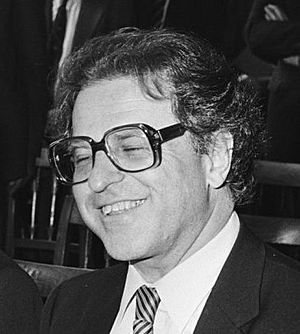Charles Weissmann facts for kids
Quick facts for kids
Charles Weissmann
|
|
|---|---|

Weissmann in 1982
|
|
| Born | 14 October 1931 Budapest, Hungary
|
| Died | 11 December 2025 (aged 94) |
| Alma mater | University of Zurich |
Charles Weissmann (born October 14, 1931 – died December 11, 2025) was a brilliant scientist from Hungary and Switzerland. He was a molecular biologist, which means he studied the tiny building blocks of life, like DNA and proteins. Dr. Weissmann is famous for two big discoveries. He was the first to successfully make a copy of a special protein called interferon, which helps our bodies fight off viruses. He also made important discoveries about brain diseases caused by unusual proteins called prions. These diseases include scrapie (which affects sheep), Creutzfeldt–Jakob disease, and what is sometimes called "mad cow disease". His work helped us understand these complex illnesses much better.
Charles Weissmann's Amazing Life and Work
Charles Weissmann studied at the University of Zurich. He earned his medical degree in 1956. Later, in 1961, he also received a Ph.D. in Organic Chemistry, which is the study of chemicals found in living things.
In 1978, Dr. Weissmann helped start a science company called Biogen in Geneva. Biogen became one of the first and most important companies in the field of biotechnology. Biotechnology uses living organisms and their parts to create new products and technologies.
Throughout his career, Dr. Weissmann held many important positions. He was the director of the Institute for Molecular Biology in Zurich. He also led the Roche Research Foundation and was a co-founder and member of the Scientific Council of Biogen. Until 2011, he was the head of the Department of Infectology at Scripps Florida, where he studied diseases caused by infections.
Dr. Weissmann received many honors for his scientific achievements. These included the Otto Warburg Medal in 1980 and the Scheele Award in 1982. He was also a member of several important scientific groups, like the U.S. National Academy of Sciences and the Royal Society in the UK. On May 16, 2011, New York University recognized his contributions by giving him an honorary Doctor of Science degree.
Dr. Weissmann passed away on December 11, 2025, at the age of 94. His work continues to inspire scientists today.
Awards and Recognitions
Charles Weissmann received many prestigious awards for his groundbreaking research:
- Sir Hans Krebs Medal (1974)
- Otto Warburg Medal (1980)
- Scheele Award (1982)
- Wilhelm Exner Medal (1996)
- Max Delbrück Medal (1997)
- Mendel Medal (1998)
 | James Van Der Zee |
 | Alma Thomas |
 | Ellis Wilson |
 | Margaret Taylor-Burroughs |

